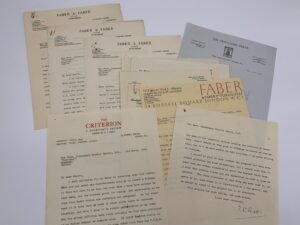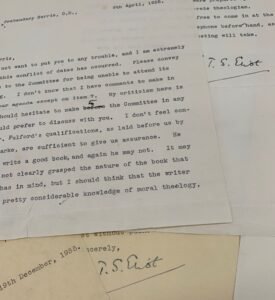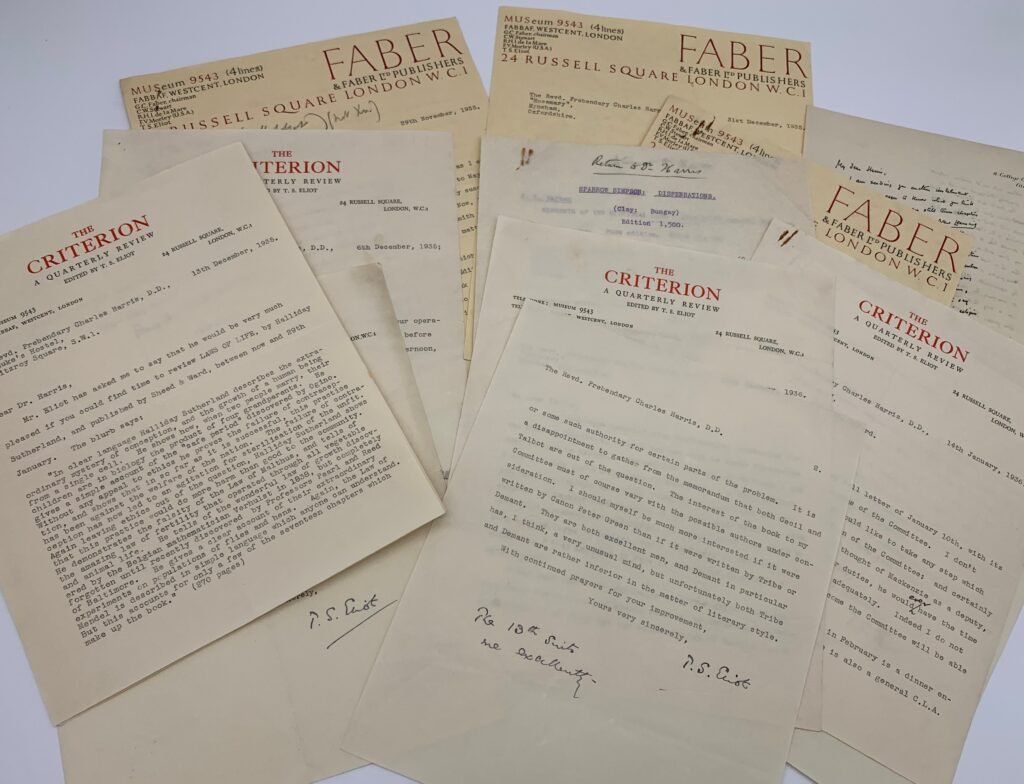A FINE T.S. ELIOT ARCHIVE
IN HIS CAPACITY AS A DIRECTOR OF FABER & FABER
OFFERING UP HIS VIEWS ON THE PUBLICATION OF A BOOK ABOUT THE CHURCH OF ENGLAND, A BOOK ON MARRIAGE AND DIVORCE WITHIN THE CHURCH, PROPOSED BOOKS BY HUGH CECIL, AND THE GENERAL RUNNINGS OF THE FIRM WITH A HEAVY EMPHESIS ON ELIOT’S OWN RELIGIOUS CONSTRUCTS AND HIS PLACE WITHIN THE CHURCH
ELIOT, T.S. (1888-1965). American-English poet, playwright, literary critic, and editor; leader of the Modernist movement in poetry; noted for: The Waste Land (1922) and Four Quartets (1943). Superlative archive of 13 Typed Letters Signed, “T.S. Eliot”, on the wonderful red imprinted Faber & Faber Ltd. letterhead and The Criterion letterheads. Twenty-eight total pages of Eliot’s writing, quarto. “24 Russell Square, London, W.C.1”, April 9, 1935 to April 22, 1936. Paperclip marks in some blank margins, else very fine condition. To “The Revd. Prebendary Harris, D.D., ‘Rosemary’, Eynsham, Oxford”. With 2 letters from HUGH CECIL (1869-1965) British politician and Sir Winston Churchill’s best man; also accompanied by another 10+ letters and financials and outlines, from various individuals affiliated with the endeavor. Due to space limitations, we offer up a heavily edited version of some of the letters. For a complete description, contact us. Eliot writes:
[April 9, 1935] “My dear Harris, I did not want to put you to any trouble, and I am extremely sorry that this conflict of dates has occurred. Please convey my apologies to the Committee for being unable to attend its first meeting….He may be able to write a good book, and again he may not. It may be that I have not clearly grasped the nature of the book that Lowther Clarke has in mind, but I should think that the writer ought to have a pretty considerable knowledge of moral theology, greater than a layman may be expected to possess. I should feel happier at least if such a book were prepared by a suitable layman in collaboration with a first-rate theologian. It is possible that I may be free to come in at the end of your meeting, and if so I will telephone beforehand, as one cannot tell in advance how long the meeting will take… With all best wishes, Yours ever, T.S. Eliot”.
[May 3, 1935] “Dear Harris, Thank you for your letter of May the 2nd with the enclosures, which I return herewith. I have been very busy until now, but expect to have rather more leasure [sic] from next week. Otherwise I would have written to you some days ago to convey the following confidential piece of information. I had the opportunity of speaking to one of the editors of The Times about Roger Fulford. He spoke very pleasantly and indeed quite highly of Fulford and mentioned him as a real authority on the history of the Regency period. I should say that Fulford has a very promising future on The Times if he stays there. I did not of course explain to my informant exactly why I was asking, but did mention that it was a question of Fulford being asked, not by Faber and Faber, to undertake a book on practical ethics….I don’t know how old Fulford is, but I suppose in his early thirties. I can’t see the point of paragraph 4 of Clarke’s letter to Fulford. I see no point in appealing to what Clarke calls ‘the average Clubman’. If he means the sort of stock-size jaded man-of-the-world it only reminds me of La Rochefoucauld’s maxim, which I can’t quote exactly: ‘Quand nos vices nous quittent, nous croyons que c’est nous qui les avons quittes’. [When our voices leave us, we believe that it is we who have left them] I don’t believe that such people are likely to want to read this kind of book anyway. As for the more serious quite young men, they are extremely moral in their own way, and ‘unlimited self-indulgence’ hardly applies. It is only that their morality is apt to be based on the wrong religion. In short, I am far from convinced that Lowther Clarke has clearly envisaged the audience for such a book. Furthermore, if the theological point of view is to be so comprehensive, will there be anything specifically Catholic about it, and if not, why should the C.L.A. sponsor the book, rather than a general publisher….Whether the subject matter could be divided in such a way as to make it suitable to sell the volumes separately remains to be discovered later. I think one should also keep in mind the possibility that it might be desirable to sell them only as a set at a guinea. Is this an undertaking which could safely be confided to any one man, except under some kind of formal supervision? Cross is, I know, a very able man indeed, and of course the very able piece of work which he has done in conjunction with Paul More has probably made him the chief authority at the moment on the history of Anglican theology. Certainly that material must be very fresh in his mind, but I don’t know how sound he would be for a constructive work of this kind…. Yours ever, T.S. Eliot”.
[May 8, 1935] “My dear Harris, I am returning to you herewith Alcan’s letter to you of the 30th April which Lowther Clarke forwarded to me without comments. I don’t remember for the moment precisely how far the Church Union was prepared to back this book. I should say that if the C.U. buys 1,000 copies at 15 francs less 25 percent Alcan will be doing very well out of it, and I should have hoped that especially with a view to completing a series, Alcan might have offered better terms. If the C.U. is prepared to put up this money, well and good, for the enterprise itself is well worth undertaking. But if the sum of 11,250 francs has to come out of the funds which have been allocated by the C.U. to the Book Committee it seems to me to require reflection….Yours ever, T.S. Eliot”.
[June 11, 1935] “Dear Harris, Clarke has passed on to me your letter of the 4th of June. I quite agree about Dr. Goudge. It seemed to me that as he came fully primed with his own notion for a book which after all had nothing whatever to do with the question of a work on dogmatic theology, he should have previously asked to have it put on the Agenda, so that it might have been discussed as a wholly separate item. The notion as he expounded it seemed to me at the time a good one, but in any case it is quite a separate issue, and only tended to confuse the debate…. Yours ever, T.S. Eliot”.
[July 19, 1935] “Dear Harris, Thank you for your note of the 17th with enclosures. I have written to Alcan on the lines of Lowther Clarke’s letter. With best wishes and prayers for your prospective operation, Yours sincerely, T.S. Eliot”.
[November 29, 1935] “My dear Harris, I am sorry that I was unable to write to you as soon as I expected, and that therefore you have been unable to write to Maynard Smith before your operation, which I pray has been highly successful. You have been much in my mind all these days. Now, I beg that you will not exert yourself to write to Maynard Smith until you are considered quite fit for such business. The matter is not so urgent as all that. I enclose a copy of the original memorandum which was drawn up by one of my colleagues for the benefit of the Editorial Board when the matter was originally discussed. I think that I enclosed a digest of the memorandum with a letter to you of which I can find no copy….Yours ever sincerely, T.S. Eliot”.
[December 6, 1935] “My dear Harris, Thank you for your letter. I am very glad that your operation has been so successful, and I am anxious to see you before you leave. I should like to come in early on Monday afternoon, and hope that that will be convenient for you. Yours sincerely, T.S. Eliot”.
[December 19, 1935] “My dear Harris, First, about the book on marriage. We are entirely favourable to your suggestion of having Lord Hugh Cecil do this if you can persuade him to undertake it. I think he ought to have your advice and guidance in matters of psychology, and also should take counsel on matters of anthropology and sociology. If Cecil won’t do it, then let us reconsider the other names. There is a certain obvious advantage in having a distinguished layman, but on the other hand I feel more confidence in Canon Peter Green than I should in Lord Wolmer. It therefore rests with you for the present to approach Cecil as and when you think best….Yours very sincerely, T.S. Eliot”.
[January 9, 1936] “My dear Harris, I have not yet replied to your letter of December 27th, although I asked my secretary to return to you the letter from Maynard Smith with the outline of his book, and also to send you Justice Talbot’s address. My Committee was gratified to hear that Lord Hugh Cecil was definitely interested, and I hope that you will be able to obtain Sir George Talbot’s cooperation. I am interested in your new suggestion of a book similar to the one which I sent you to review, but must wait until your design is more advanced before proposing it to my Committee… I am returning herewith the memoranda of the expenses of Dispensations and Elements of the Spiritual Life. These have been copied, and give us a basis on which to prepare some sort of draft agreement to submit to you. There is one thing that has been on my mind for some little time; and I have a suggestion to make. It seems to me that the Committee ought to be able to meet from time to time under a deputy-chairman…I am glad to feel from the tone of your letter that you have many years of useful activity before you. I hope that your recuperation is progressing, and that you have been in less pain and have been able to walk about more. When you are ready for a Committee meeting, I suggest that it might be arranged to take place in Oxford. With sufficient warning I could always come down for the purpose. I am to be in Ireland for a few days from the 22nd of the month to perhaps the following Monday…Yours ever, T.S. Eliot”.
[January 14, 1936] “My dear Harris, …I don’t think for a moment that any one would like to take any step which might deprive you of the direction of the Committee: and certainly no one less than myself. I only thought of Mackenzie as a deputy, and I doubt whether, with his other duties, he would ever have the time to fulfill the function of chairman adequately. Indeed I do not know in what direction in times to come the Committee will be able to look for a successor. The only engagement that I have in February is a dinner engagement on the 5th. I see that there is also a general C.L.A. meeting on the 11th, but I don’t suppose that any of us needs attend that. Please choose what date you like, remembering that the least convenient day of the week for me is Wednesday. I have also received the typescript of Maynard Smith’s book, and will read it as quickly as possible, so that I may get it to Lowther Clarke in time to read and return by the end of the month. But you must remember that the typescript will have to be read by at least one other director besides myself…Yours very sincerely, T.S. Eliot”.
[January 20, 1936] “My dear Harris, I have read with interest your confidential memorandum for the Working Committee, which I suppose will be under discussion when we meet in Oxford. You mention that you think items 1 and 3 are suitable for a non-religious publisher. I presume that you meant to include also items 7 and 8. I have read the two chapters of Maynard Smith’s book, as has one other director, with very great interest and enjoyment. I think myself that it is a book that we ought to publish, and I shall urge it strongly. I think myself that it ought to have illustrations to give it a wider appeal. I had been under the impression from your letter that Lord Hugh Cecil was willing, or almost willing, to undertake the book on marriage ….With continued prayers for your improvement, Yours very sincerely, T.S. Eliot. [The following is written in Eliot’s hand. P.S.:] The 13th suits me excellently.”
[March 3, 1936] “…I must apologize for my delay in answering your kind letter. What you say about the Secretaryship puts me in rather a dilemma. It does not seem to me that the work that I have done amounts to very much, and the reasons given for taking the opportunity to resign from these duties are certainly not adequate! On the other hand it is true that my work of other kinds tends to increase steadily, and that I have to be rather parsimonious of my time. And the actual official work could probably be done more efficiently by Father Beever or someone else. My chief function really is in relation to books suitable to some other firm than the S.P.C.K. On the whole I should prefer to leave to your own decision the whole matter. …I should be glad to know whether any progress has been made toward providing the book on marriage, and I should also like to know what the actual situation is about the Maynard Smith book. I hope that Lowther Clarke got the typescript in time to form an opinion. The other directors of this firm who have read it, or parts of it, have found it as interesting as I did myself, and we should be sorry if the project had to be abandoned. With prayers for your health, and good wishes, Yours ever sincerely, T.S. Eliot”.
[April 22, 1936] “… It is rather difficult for me to advise about the size and price of your book without having knowledge of the size of the probable public for such a work. I should be inclined to think that the price ought to be kept as low as possible, and it will be a book that ought to be in the hands of every priest and of every layman who takes any part in Church affairs. I should hope that it could be priced as low as 8s. 6d., and if the estimate of the demand justified it, at an even lower price. Certainly there is a great difference in the public mind between 8s. 6d. and half a guinea. I should think that it could afford to be a pretty good length, say 80,000 words, if you want to put that much in. I envisage it rather as something compact and handy, but appearing to give a great deal for the price, than as bulky and impressive. It would presumably be a book to be used for reference as well as to be read straight through, and if that is so it could afford to be bigger than a book merely for consecutive reading. It would be desirable to get opinions from the bookselling trade about the probable sale. But everything I say, of course, is very tentative, and these are really questions to be decided in conjunction with whoever publishes the book. With all best wishes, Ever yours, T.S. Eliot”.
Eliot material of this length, and complexity is simply not readily available in our experience, and this archive offers the eventual owner an opportunity to acquire a truly remarkable holding that defines this portion of Eliot’s life, and one of the 20th century’s major poets.
$26,500.00




